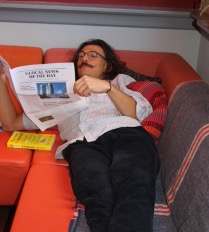Events
Room from the Future: What does it feel like to live in a degrowth world in 2112?
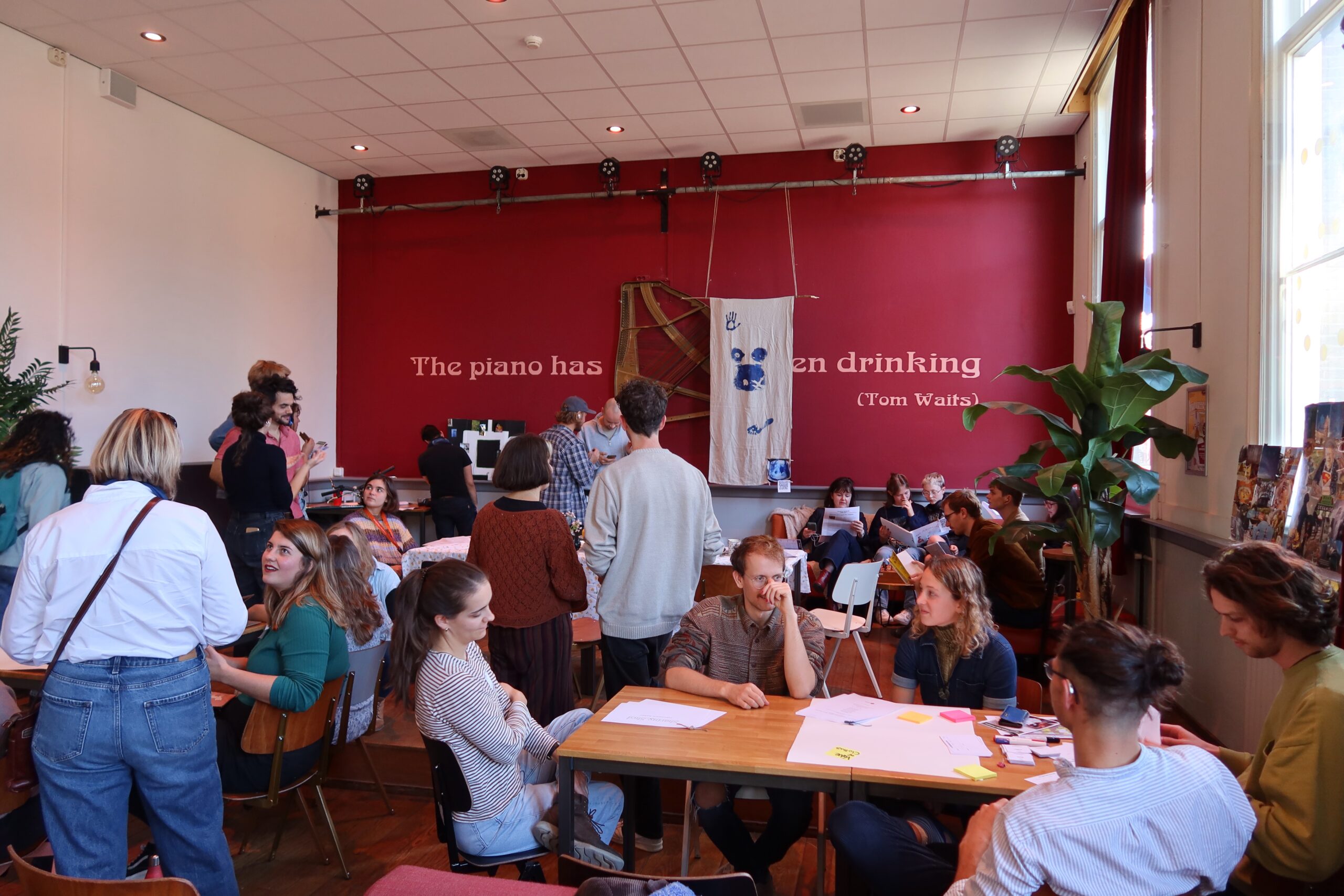
The ‘Room from the Future’ degrowth exhibit at Parnassos café in Utrecht.
On November 1, nine students from the Sustainable Development master’s at Utrecht University presented their collective scenario project, ‘Room from the Future’. They created an immersive living space situated in the year 2112 within a hypothetical world that has followed a degrowth path and achieved well-being within limits. This event was the culmination of their 9-week-long self-organised course.
‘Room for the Future’ took place at the Parnassos café in Utrecht. Students invited visitors to immerse themselves in the space and reflect on how it might feel to live in a future world where well-being within limits is the norm. This event emerged from their self-organised course, “Degrowth futures: Exploring and constructing degrowth scenarios through self-organised learning.” In this blog post students highlight key elements of the scenario project with images and accompanying narratives and end with their reflection on the event.
The degrowth movement
As emphasised in the latest report by the Intergovernmental Panel on Climate Change — the UN body responsible for compiling, assessing, and presenting the most up-to-date scientific research on anthropogenic climate change — the world is set to surpass 1.5ºC of global warming by 2040. Drastic reductions in carbon emissions are required to avoid ecological and social catastrophes (IPCC, 2022). It is becoming increasingly evident that technological solutions alone are no longer sufficient to address this issue; instead, some scholars and activists argue that a fundamental restructuring of society is urgently needed (Kothari et al., 2014). In particular, there is a growing understanding that endless economic growth is incompatible with ecological limits (Hickel & Kallis, 2020), and there is a need to create a new system that is not dependent on growth.
In response to this, a set of concepts and movements has emerged worldwide to present alternatives to the dominant ‘sustainable development’ paradigm, which does not question the notion of economic growth (Kothari et al., 2014). One such movement is ‘degrowth,’ which originated in France in the 1970s (D’Alisa et al., 2015). The following passage, taken from Degrowth: A vocabulary for a new era, gives a broad overview of what the degrowth movement calls for:
Degrowth signifies, first and foremost, a critique of growth. It calls for the decolonisation of public debate from the idiom of economism and for the abolishment of economic growth as a social objective. Beyond that, degrowth also signifies the desired direction in which societies will use fewer natural resources and organise and live differently than today. ‘Sharing’, ‘simplicity’, ‘conviviality’, ‘care’ and the ‘commons’ are primary significations of what this society might look like (D’Alisa et al., 2015, p. 3).
Click here to access the welcome audio for the event, along with two meditations. Students designed these to set the scene of the scenario and allow time to arrive in the exhibition space. The meditations offer a moment to land. Connect with the values of reciprocity, care, and gratitude that have emerged through the course as important aspects of degrowth transitions. You are also encouraged to take a moment and consider how you can practise these values in the present and future.
Project highlights
Body print
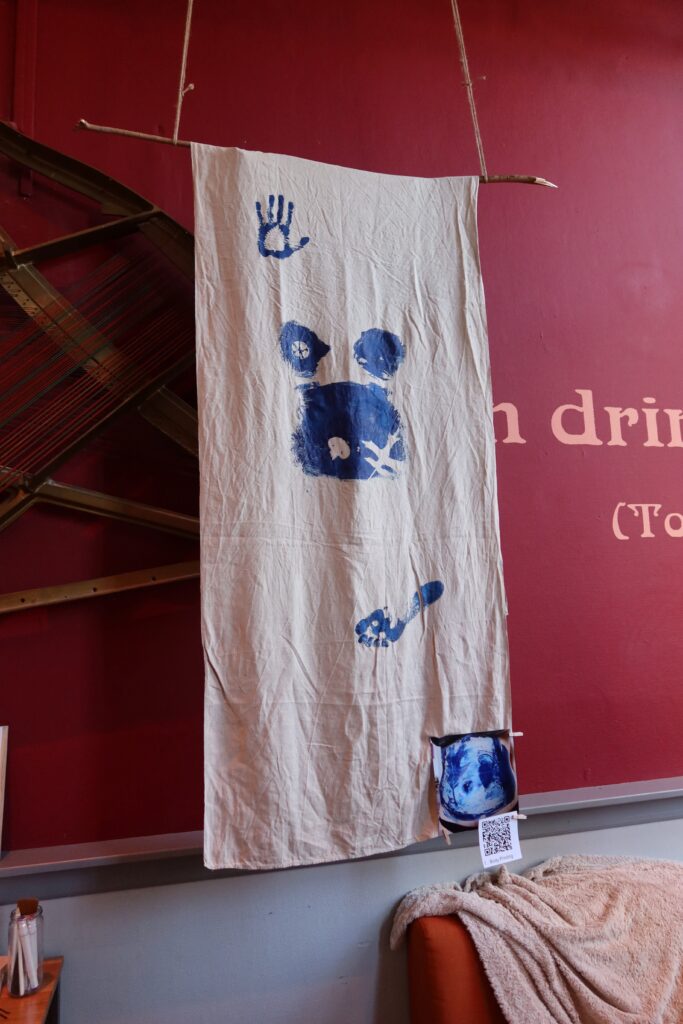
White cloth with a blue imprint of body parts hanging from the ceiling, resembling Yves Klein’s body art
One element of the ‘Room from the future’ is a body print, which consists of prints of the human body together with elements of nature — leaves, an orange slice, seeds, and a mushroom. Human-nature relationships and care are elements of a degrowth discourse. They can be combined to understand that to respect the natural environment; we need to take off the pressure we put on it through extraction and use of natural resources. On a personal level, finding unity with nature and engaging with creative action can be an act of self-care and a meaningful way to deal with mental health issues, such as poor body image.
Click here for an interview with Julia, the creator of the body print.
Calendar
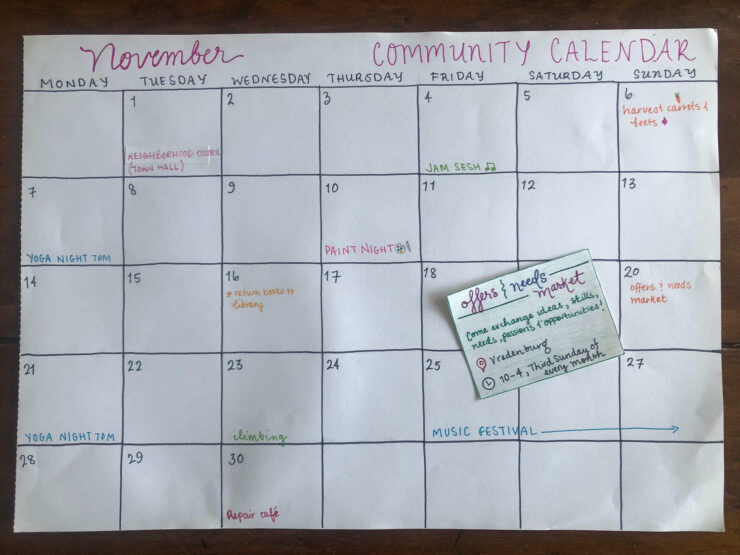
A4 calendar of the month of November, giving an overview of community activities like ‘jam sesh’ and ‘repair café’
This calendar offers a glimpse into people’s daily activities in 2112, inviting viewers to reflect on their daily schedule and how it might look different in a degrowth world. The neighbourhood council meeting shows that citizens actively engage in the political process. The Offers and Needs Market is a space to identify and exchange passions, knowledge, skills, resources, opportunities, and needs rather than the material goods exchanged in a traditional market. Finally, the repair café is a space to mend and repair items that are broken, as an alternative to buying something new. This project emphasised that life in a degrowth world would be joyful and fun, with more time available for leisure and community activities.
Click here for an interview with Gen and Anya, the creators of the calendar
Map of Utrecht
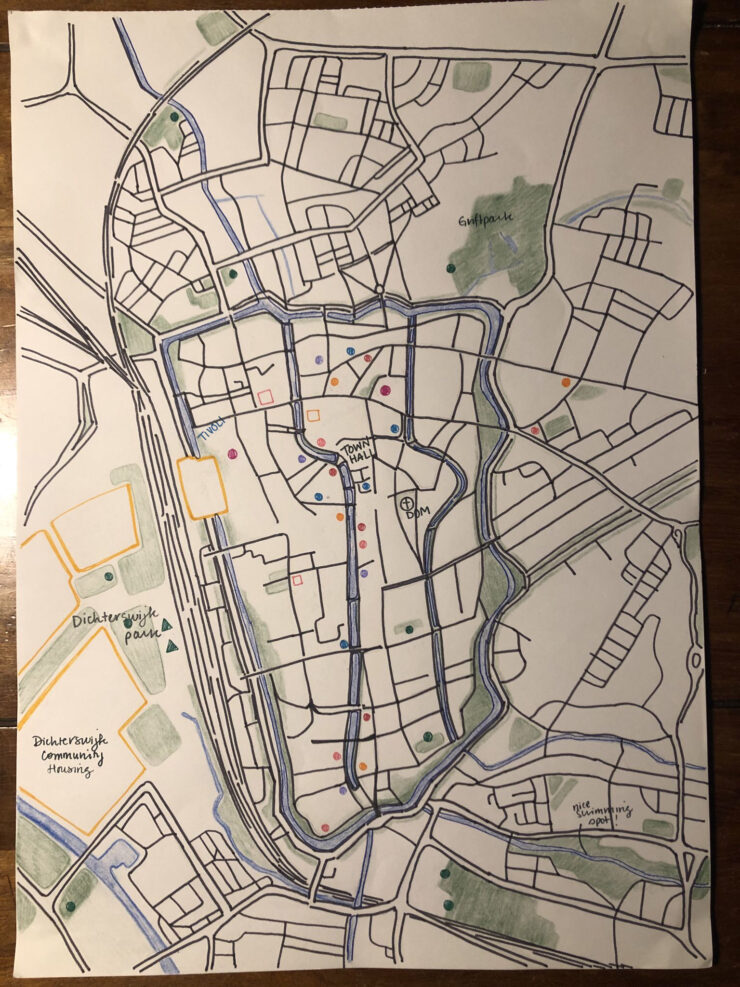
Hand-drawn map of Utrecht
The map depicts changes and similarities in Utrecht in 2112. The mall and Jaarbeurs centre would be converted into housing complexes, the car parks into green spaces, community gardens, or seed banks. Restaurants, bars, second-hand/slow fashion shops, art studios, and music venues like Tivoli would still populate the city centre.
Click here for an interview with Gen, the creator of the map.
Glocal News (Newspaper)
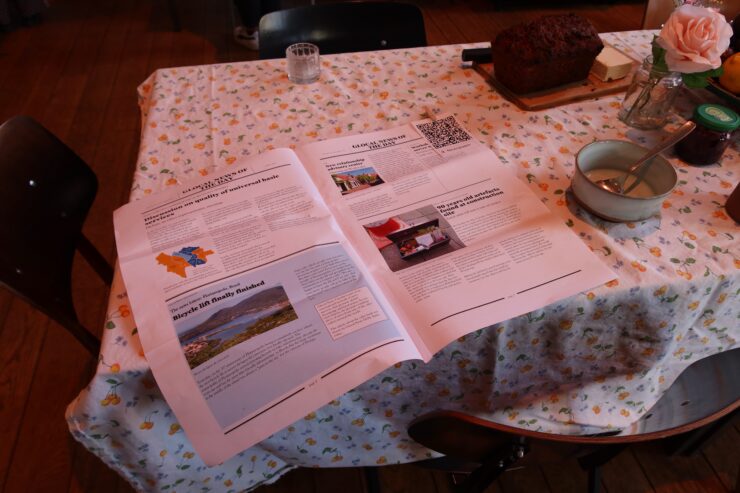
DIY Newspaper lays open on a kitchen table
This newspaper from the future gives insights into different aspects of life in 2112. Reliable information and independent journalism are a vital part of a degrowth society and the basis for a functioning democratic system. Glocal News is a news outlet that provides global knowledge and supports local action!
Click here for an interview with Jana, the creator of the newspaper.
Fruit and vegetable bowl
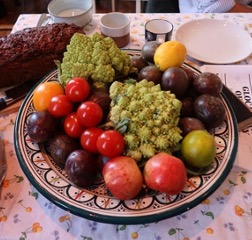
Bowl with romanesco, tomatoes, apples and other fruits
During one of the course sessions, we went dumpster diving to reflect on the current highly inefficient food system (currently, a third of all food is wasted globally) and to imagine a post-growth food system. In 2112, we hope that food waste will be practically nonexistent, and food diversity will be celebrated. This can be seen through the ‘imperfect’ fruits and vegetables in the bowl (which we rescued from a dumpster in Utrecht).
Clothes and sewing tools
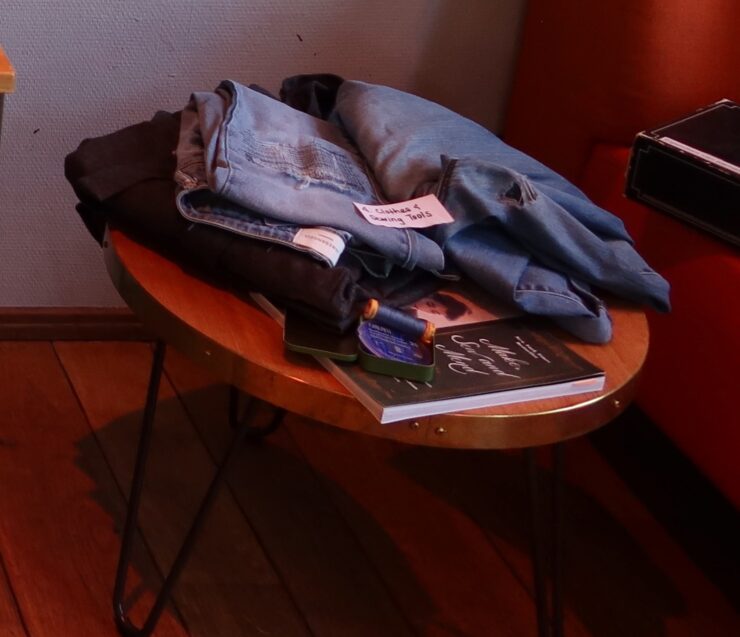
Three pairs of jeans are displayed on a side table with thread and needles
The clothes in need of mending, the mended clothes, and the sewing tools demonstrate that in a degrowth society in 2112, we imagine people will take better care of their clothing and repair things rather than throw them away. This represents a significant shift from current patterns of overconsumption of clothing in the Global North that are linked to a disconnect from the true costs of producing and disposing of clothing.
Children’s book
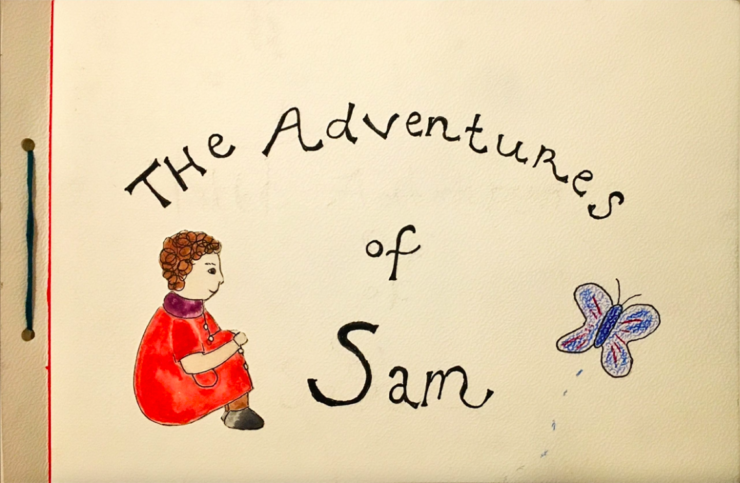
Hand-painted book cover ‘The Adventures of Sam’ with illustration of a little child sitting an watching a butterfly
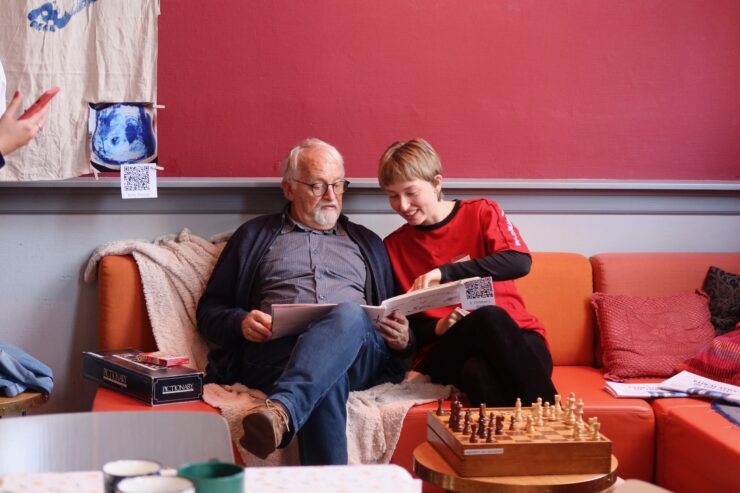
A student reads ‘The Adventures of Sam’ to a visitor
Read ‘The Adventures of Sam’ here: https://academyofhope.sites.uu.nl/wp-content/uploads/sites/845/2022/11/The_Adventures_of_Sam.pdf
This children’s book seeks to convey how we expect people’s connection to the non-human world will have changed by 2112 and how this may be reflected in children’s literature. We imagine that people will generally be more mindful of and engaged with the non-human world around them and act according to a need and wish to care for and protect the non-human world.
Click here for an interview with Sabine, Pia, and Merel, the creators of the children’s book.
Art project
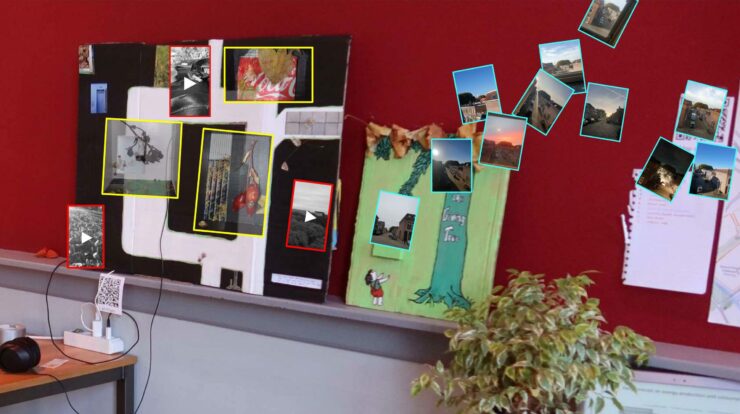
Digital collage of photos and videos
These art pieces are meant to be an ongoing project by someone in 2112 with artefacts found on a current local construction site. The artefacts were collected from the streets by a person living in Utrecht in 2022. This person walked through the streets of the neighbourhood, collected nature and culture objects (e.g., leaves or coke cans), took videos of small encounters with nature in the city, took photos of the tree they could see from their bedroom window every day and was obviously trying to connect or explore their connection to nature. In 2112, the project author tries to make sense of these objects and reconstruct the urban human-nature relationship from 2022 through dominant media forms of that time: paint, photos, and smartphone screens.
Click here for an interview with Pia, the creator of the art project.
Sharing shed
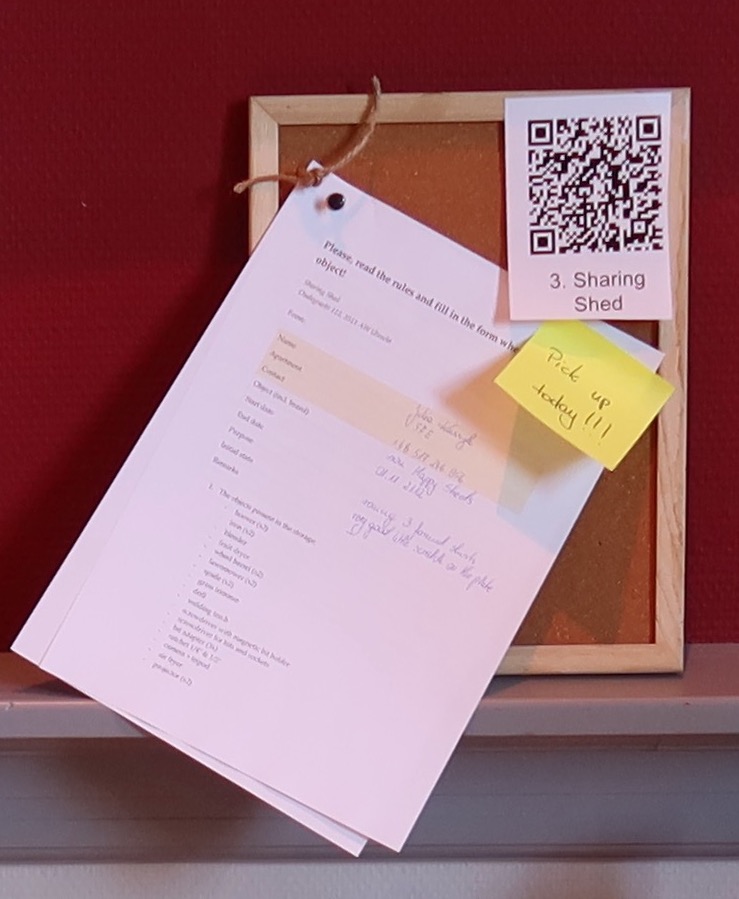
A ‘Sharing shed’ form pinned on a bulletin board
Sharing shed information booklet and form: https://academyofhope.sites.uu.nl/wp-content/uploads/sites/845/2022/11/Sharing_Shed_final.pdf
In 2022, many households have their own set of appliances and tools for the individual use of their tenants. Moreover, some of them are replaced before they break or wear out because of being considered less efficient than new models or because of effective advertising that encourages people to buy new goods. Instead, these objects could be shared and used to their full potential before being discarded, contributing to lowering our energy and material consumption, which is a core tenet of degrowth. Here, you can see the procedure for borrowing items from the ‘sharing shed,’ which houses items available for communal use.
Click here for an interview with Julia, the creator of the sharing shed.
Reflection
We were very happy about the visitors’ interest in our exhibit. It was wonderful to see how many people wanted to stay for a while and take the time to talk with us and engage with the different projects we presented. For us, as a group, it was great to experience all our individual projects coming together in one exhibit. We felt proud of what we created as a group and how we conveyed degrowth concepts creatively and less formally that appeared to resonate with the visitors.
If you want to learn more about the course in which we created this exhibit, you can look at our syllabus here: https://academyofhope.sites.uu.nl/wp-content/uploads/sites/845/2022/11/Degrowth_Futures_Syllabus.pdf
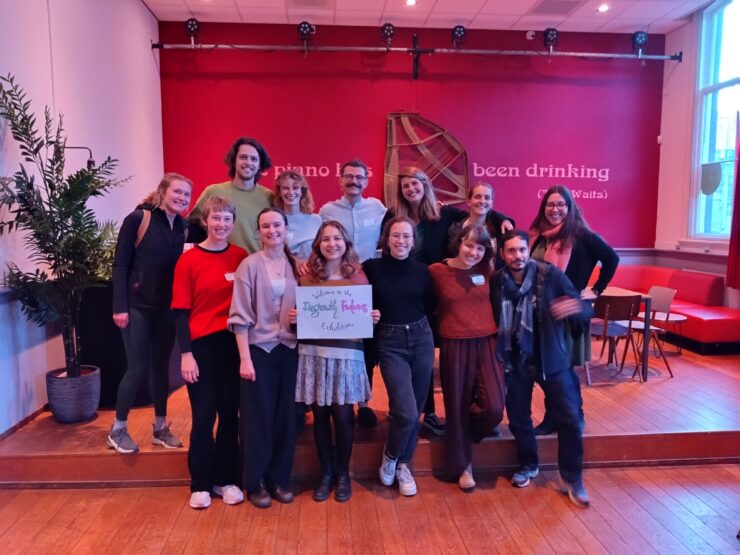
The event organisers and their supervisors at the end of the exhibit.
References
- D’Alisa, G., Demaria, F., & Kallis, G. (2015). Degrowth: A Vocabulary for a New Era. Routledge.
- Hickel, J., & Kallis, G. (2020). Is Green Growth Possible? New Political Economy, 25(4), 469–486. https://doi.org/10.1080/13563467.2019.1598964
- IPCC. (2022). Climate Change 2022: Impacts, Adaptation, and Vulnerability. Contribution of Working Group II to the Sixth Assessment Report of the Intergovernmental Panel on Climate Change [H.-O. Pörtner, D.C. Roberts, M. Tignor, E.S. Poloczanska, K. Mintenbeck, A. Alegría, M. Craig, S. Langsdorf, S. Löschke, V. Möller, A. Okem, B. Rama (eds.)]. Cambridge University Press. Cambridge University Press, Cambridge, UK and New York, NY, USA, 3056 pp., doi:10.1017/9781009325844.
- Kothari, A., Demaria, F., & Acosta, A. (2014). Buen Vivir, Degrowth and Ecological Swaraj: Alternatives to sustainable development and the Green Economy. Development, 57(3–4), 362–375. https://doi.org/10.1057/dev.2015.24


